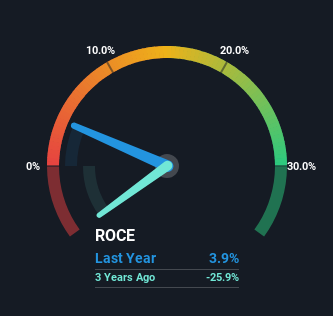- Hong Kong
- /
- Entertainment
- /
- SEHK:9899
Cloud Music (HKG:9899) Is Looking To Continue Growing Its Returns On Capital

What are the early trends we should look for to identify a stock that could multiply in value over the long term? Firstly, we'd want to identify a growing return on capital employed (ROCE) and then alongside that, an ever-increasing base of capital employed. This shows us that it's a compounding machine, able to continually reinvest its earnings back into the business and generate higher returns. So when we looked at Cloud Music (HKG:9899) and its trend of ROCE, we really liked what we saw.
What Is Return On Capital Employed (ROCE)?
For those who don't know, ROCE is a measure of a company's yearly pre-tax profit (its return), relative to the capital employed in the business. To calculate this metric for Cloud Music, this is the formula:
Return on Capital Employed = Earnings Before Interest and Tax (EBIT) ÷ (Total Assets - Current Liabilities)
0.039 = CN¥332m ÷ (CN¥12b - CN¥3.1b) (Based on the trailing twelve months to December 2023).
Therefore, Cloud Music has an ROCE of 3.9%. Ultimately, that's a low return and it under-performs the Entertainment industry average of 6.6%.
See our latest analysis for Cloud Music

In the above chart we have measured Cloud Music's prior ROCE against its prior performance, but the future is arguably more important. If you'd like, you can check out the forecasts from the analysts covering Cloud Music for free.
What The Trend Of ROCE Can Tell Us
Cloud Music has recently broken into profitability so their prior investments seem to be paying off. The company was generating losses five years ago, but now it's earning 3.9% which is a sight for sore eyes. Not only that, but the company is utilizing 103% more capital than before, but that's to be expected from a company trying to break into profitability. We like this trend, because it tells us the company has profitable reinvestment opportunities available to it, and if it continues going forward that can lead to a multi-bagger performance.
On a related note, the company's ratio of current liabilities to total assets has decreased to 27%, which basically reduces it's funding from the likes of short-term creditors or suppliers. This tells us that Cloud Music has grown its returns without a reliance on increasing their current liabilities, which we're very happy with.
What We Can Learn From Cloud Music's ROCE
To the delight of most shareholders, Cloud Music has now broken into profitability. Since the stock has returned a solid 28% to shareholders over the last year, it's fair to say investors are beginning to recognize these changes. Therefore, we think it would be worth your time to check if these trends are going to continue.
Before jumping to any conclusions though, we need to know what value we're getting for the current share price. That's where you can check out our FREE intrinsic value estimation for 9899 that compares the share price and estimated value.
While Cloud Music isn't earning the highest return, check out this free list of companies that are earning high returns on equity with solid balance sheets.
Valuation is complex, but we're here to simplify it.
Discover if NetEase Cloud Music might be undervalued or overvalued with our detailed analysis, featuring fair value estimates, potential risks, dividends, insider trades, and its financial condition.
Access Free AnalysisHave feedback on this article? Concerned about the content? Get in touch with us directly. Alternatively, email editorial-team (at) simplywallst.com.
This article by Simply Wall St is general in nature. We provide commentary based on historical data and analyst forecasts only using an unbiased methodology and our articles are not intended to be financial advice. It does not constitute a recommendation to buy or sell any stock, and does not take account of your objectives, or your financial situation. We aim to bring you long-term focused analysis driven by fundamental data. Note that our analysis may not factor in the latest price-sensitive company announcements or qualitative material. Simply Wall St has no position in any stocks mentioned.
About SEHK:9899
NetEase Cloud Music
An investment holding company, engages in the operation of online platforms to provide music and social entertainment services in the People’s Republic of China.
Flawless balance sheet with solid track record.
Market Insights
Community Narratives



